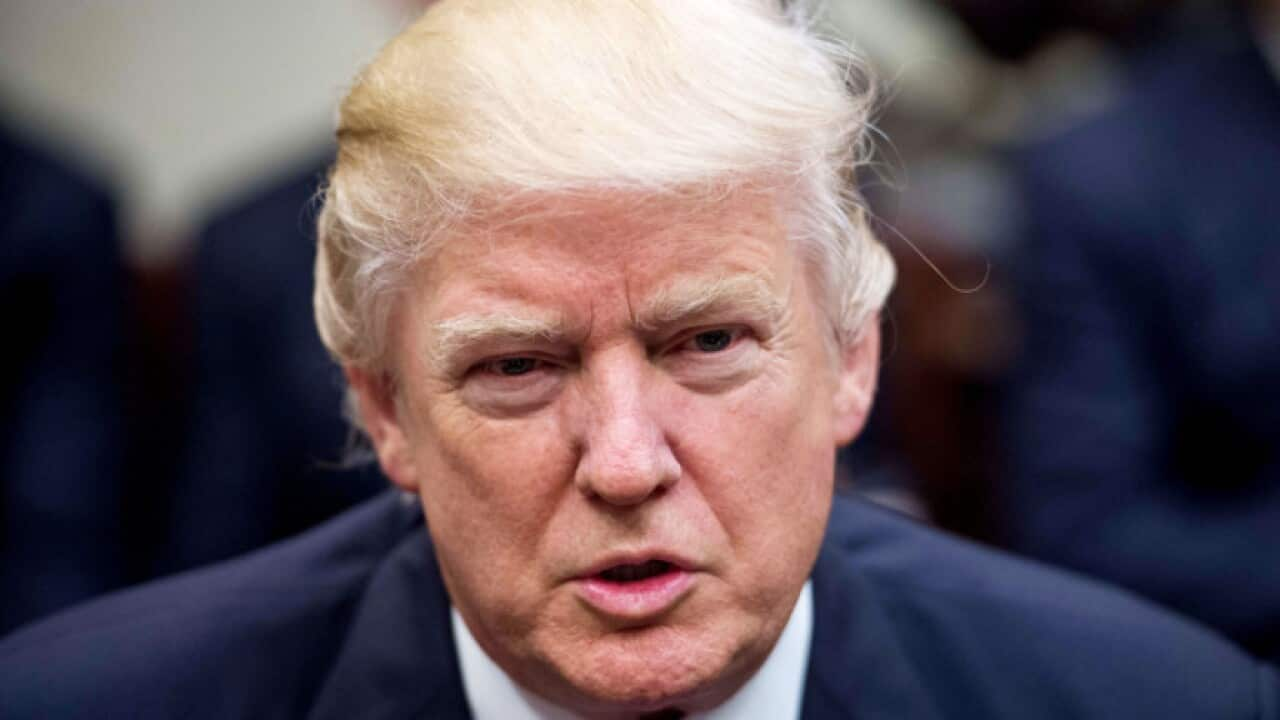The lawsuits have continued to build in the days since US President Donald Trump signed an executive order banning refugees and putting seven Muslim majority countries on a 'no entry' list.
From individual suits on behalf of specific refugees barred from entering the US based on their nationality, through to US states filing suits stating the so-called 'Muslim ban' order was unconstitutional - the number of legal challenges is growing.
The order halted travel by people with passports from Iran, Iraq, Libya, Somalia, Sudan, Syria and Yemen for 90 days.
It also barred resettlement of refugees for 120 days and indefinitely banned Syrian refugees.
Here are the lawsuits filed so far:
Darweesh vs Trump
US rights groups filed the first legal challenge to President Donald Trump's order halting the arrival of refugees and travellers from seven majority Muslim countries.
The suit was filed on Saturday by the American Civil Liberties Union and other advocacy groups after two Iraqi men, including former translator for the US Army, Hameed Khalid Darweesh, were detained Friday night at John F Kennedy Airport in New York. It sought their release on grounds of unlawful detention.
The group managed to get a stay on all deportations of people detained under the order until February 21, but there are reports the court order has been ignored by some customs officials and people have been sent back.
The groups asked that the challenge be given class action status so they can represent all refugees and travellers held over Trump's executive order.
The New York Times reported that airport authorities started detaining travellers as early as Friday night.
It said one of the Iraqi men held in New York had worked for the US government in Iraq for 10 years and the other was coming to America to join his wife, who had worked for a US contractor.
The Times quoted their lawyers as saying both men had valid visas to travel to the United States.
The Council on American-Islamic Relations
US Muslim leaders filed a suit against President Trump on Monday over the immigration order, which they described as a "fear-mongering" attempt at keeping members of their religion out of the country.
Nihad Awad, executive director of the Council on American-Islamic Relations (CAIR), joined 26 others as plaintiffs in the lawsuit alleging Mr Trump's temporary ban on immigrants from the seven Muslim-majority countries was in fact a "Muslim exclusion order" that violates the US constitution's religious freedom protections.
"Donald Trump's executive order is not based on national security, it is based on fear-mongering," Mr Awad said on Monday.
"This is not a Muslim ban, it is a Muslim exclusion order."
Besides excluding Muslim refugees and immigrants from abroad, the suit alleges Mr Trump's executive order will force out US-resident Muslims from those seven countries "by denying them the ability to renew their lawful status or receive immigration benefits... based solely on their religious beliefs".
That will lead to "the mass expulsion" of both immigrant and non-immigrant Muslims, the suit, filed in the district court in Alexandria, Virginia, alleged.
Plaintiffs in the lawsuit include several CAIR officials, among them prominent Muslim-American lawyers and activists.
They also include unnamed plaintiffs described as legal residents and visitors to the country who, if they left temporarily, would not be able to return to the US under Trump's order.
The suit said the order reflected anti-Muslim sentiments that Trump expressed during the presidential campaign.
"The Muslim Exclusion Order is the as‐promised outcome of Defendant Trump's hateful, year-long campaign which was fuelled, in significant part, by a desire to stigmatize Islam and Muslims," it said.
Lawyers said the order violates the US constitution's protections of religious freedoms and the "establishment clause", which bans the government from making laws that favour or discriminate against specific religions.
Washington State
The top prosecutor in the state of Washington filed a lawsuit on Monday challenging the order as illegal and unconstitutional and demanding an immediate halt to its implementation.
"No one is above the law - not even the president," Attorney General Bob Ferguson told a news conference.
"And in the courtroom, it is not the loudest voice that prevails. It's the Constitution."
Ferguson's lawsuit - the first of its kind - targets Mr Trump, Homeland Security and high-ranking administration officials. It calls for key provisions of the president's executive order on immigration to be declared illegal and unconstitutional.
The complaint argues that the travel ban, which has been met with an uproar both in the United States and abroad, was separating and harming families "and undermining Washington's sovereign interest in remaining a welcoming place for immigrants and refugees".
Several major companies in Washington state, including Amazon and Expedia, filed declarations alongside the lawsuit explaining the fallout of the executive order on their operations and employees.
"Never has our system of checks and balances been more important," said Washington governor Jay Inslee, who joined Ferguson at the press conference.
"Until Congress takes this administration to task for the obvious moral and legal injuries suffered by innocent, law-abiding people entering our country, it is up to states to protect and promote the rights of the people who reside in our borders."
The suit urges the court to schedule a hearing on the matter within two weeks.
The states of Massachusetts, New York and Virginia
Massachusetts, New York and Virginia joined the legal battle against the travel ban, which the White House deems necessary to improve national security.
The challenges contend the order violated the US Constitution's guarantee of religious freedom.
Massachusetts contended the restrictions run afoul of the establishment clause of the 1st Amendment of the US Constitution, which prohibits religious preference.
"At bottom, what this is about is a violation of the Constitution," Massachusetts Attorney General Maura Healey said.
"It discriminates against people because of their religion, it discriminates against people because of their country of origin," Healey said at a Boston press conference, flanked by leaders from the tech, healthcare and education sectors who said that the order could limit their ability to attract and retain highly educated workers.
Massachusetts will be backing a lawsuit filed over the weekend in Boston federal court by two Iranian men who teach at the University of Massachusetts at Dartmouth.
A federal judge blocked the government from expelling those men from the country and halted enforcement of the order for seven days, following similar but more limited moves in four other states.
The attorneys general of New York and Virginia also said their states were joining similar lawsuits filed in their respective federal courts challenging the ban.
"As we speak, there are students at our colleges and universities who are unable to return to Virginia," Virginia Attorney General Mark Herring told reporters.
"This is not an action I take lightly, but it is one I take with confidence in our legal analysis."
The city of San Francisco
San Francisco City Attorney Dennis Herrera filed suit over President Trump's order threatening to cut funds to cities with sanctuary policies, a move that could stop the flow of billions of dollars to major US population centres including New York, Los Angeles and Chicago.
"If allowed to be implemented, this executive order would make our communities less safe," he said.
"It would make our residents less prosperous, and it would split families apart."
Sanctuary cities adopt policies that limit cooperation, such as refusing to comply with US Immigration and Customs Enforcement detainer requests.
Advocates of the policies say that, beyond helping police with crime reporting, they make undocumented immigrants more willing to serve as witnesses if they do not fear that contact with law enforcement will lead to their deportation.
The San Francisco action contends that Trump's orders in question violate the 10th Amendment of the US Constitution, which states that powers not granted to the federal government should fall to the states.
Michael Hethmon, senior counsel with the conservative Immigration Reform Law Institute in Washington, called the San Francisco lawsuit a "silly political gesture", noting that prior federal court decisions make clear that the US government "can prohibit a policy that essentially impedes legitimate federal programs".
The Arab-American Civil Rights League
A civil rights group in Michigan has sued on behalf of US green-card holders affected by President Trump's order.
The Arab-American Civil Rights League argues in the suit filed on Tuesday in Detroit's US District Court that the executive action is unconstitutional and targets immigrant communities. It represents about a half-dozen legal, permanent residents, some of whom have been turned away from US-bound planes.
League Director Rula Aoun says most plaintiffs live in the Detroit area, which has one of the nation's largest Arab and Muslim communities.
Ms Aoun says green-card holders have a "lawful right to be in the US" but have been detained or denied entry.
Major US-based tech companies
A group of technology companies planned to meet on Tuesday to discuss filing an amicus brief in support of a lawsuit challenging President Trump's order, a spokesperson for a company organising the gathering said.
The meeting was called by GitHub, which makes software development tools.
Amicus, or friend of the court, briefs are filed by parties who are not litigants in a case but want to offer arguments or information to the judge.
Alphabet Inc's Google, Airbnb Inc and Netflix Inc are among the companies invited, a separate person familiar with the situation said.
Representatives for Google and Netflix could not immediately be reached for comment. An Airbnb spokesman declined to comment.
The technology sector has become the clearest corporate opponent to the ban announced last week. The industry depends on talent from around the world, and companies have been considering the best way to muster their resources, with efforts so far including statements condemning the move and financial support for organisations backing immigrants, such as the American Civil Liberties Union.
Michal Rosenn, general counsel for fundraising company Kickstarter, which will be involved in a filing, said the effort began on Monday.
"We're all very shaken. We're shaken to see our neighbours and our families and our friends targeted in this way," Rosenn said. "All of us are trying to think about what we can do."
The discussions among the tech companies come after Amazon.com Inc and Expedia Inc filed declarations in court on Monday supporting a lawsuit filed by the Washington state attorney general. Amazon and Expedia said Trump's order adversely impacts their businesses.
A separate lawsuit challenging President Trump's order as unconstitutional was filed on Monday by the Council on American-Islamic Relations. If the tech companies decide to file an amicus brief as a group, it is unclear which case they would weigh in on.
Other companies invited to meet include Adobe Systems Inc, AdRoll, Automattic Inc, Box Inc, Cloudera Inc, Cloudflare Inc, Docusign, Dropbox, Etsy Inc, Evernote Corp, Glu Mobile Inc, Lithium, Medium, Mozilla, Pinterest, reddit, Salesforce.com Inc, SpaceX, Stripe, Yelp Inc, and Zynga Inc, the source said.
A representative for internet communications company Twilio confirmed it will be involved in filing an amicus brief.
Cloudflare chief executive Matthew Prince said the internet security company was willing to consider and sign an amicus brief. Denelle Dixon, chief legal and business officer for Mozilla, said the immigration order was "misplaced and damaging, to Mozilla, to the technology industry and to the country".
Spokespeople for Box and AdRoll said they would attend the meeting. An Etsy spokeswoman said the company received Github's invite but could not confirm if it would move forward with the group.
Salesforce declined to comment. Representatives for the other companies could not immediately be reached for comment.













